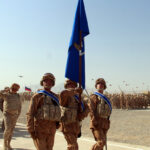One month after a devastating earthquake, Moroccans jubilated at the news of the country co-hosting the 2030 together with Spain and Portugal.
Beyond the sports significance, the tournament will give a much needed boost to Morocco’s economy as it forges ahead with earthquake reconstruction and as it also plans to meet its new development model goal.
The new development model aims at increasing the share of private investments to two-thirds instead of one thirds currently and to double the GDP per capita by 2035.
Hosting the largest and most popular sports tournament in the world is a message to foreign investors indicating the trust and confidence of the international community in Morocco’s stability and potential.
Morocco’s King welcomed the news and congratulated Spain and Portugal while saying the country will spare no efforts to ensure a harmonious coordination.
Head of Morocco’s football federation Fouzi Lekjaa, who is also budget minister, said the Kingdom reaps the fruits of the King’s leadership voicing hope to see Morocco hosting the final.
Already works are underway to build a new stadium that could accommodate up to 90,000 people in Casablanca. Lekjaa said other cities: Rabat, Tangier, Agadir, Marrakech and Fez would also be prepared to host World Cup games.
Construction and investment in infrastructure and tourism would give impetus to Morocco’s economy bolstering growth and creating jobs.
The country is also poised to attract more tourists as it builds on the success of the Atlas Lions in 2022. Football is now a pillar of Morocco’s soft power that will strengthen the tourist sector in the country.
Morocco’s tourism promotion plan aims to attract 17.5 million tourists by 2026 generating revenue of $12 billion and 80,000 direct jobs and 120,000 indirect.
Holding the World Cup could help Morocco attract more than 17.5 million tourists by 2026 as RAM plans to quadruple its fleet and open new routes.
Source: North Africa Post
















